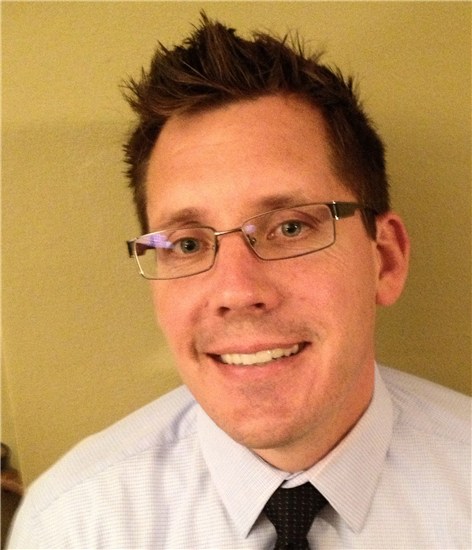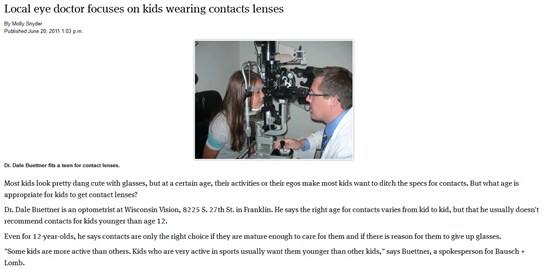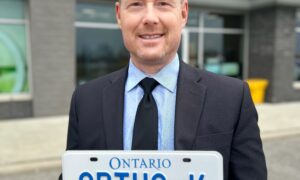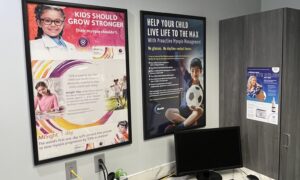By Dale Buettner, OD
Media training equips you to effectively communicate on local TV, radio, print and online media—and to become a regular contributor on health-related stories. Looking confident and authoritative on air or in print is a great way to market your practice in your community.
It’s easy to laugh at the bumbling, inarticulate person on TV who lets the interviewer walk all over him–until that’s you! Communicating effectively with newspaper and television reporters isn’t as easy as it may seem. For that reason, some optometrists, such as myself, have taken advantage of opportunities to become more media savvy. A few years ago, I accepted an invitation to go through a media training program provided by one of my practice’s vendors, Bausch & Lomb. We have been able to establish good relationships with local reporters, and we’ve kept our practice in the local news regularly, and our patients notice.
Media Training:
Be Your Local Eye Expert
In 2010, Bausch & Lomb initiated Project Access, a media training program that, over three years, provided 50 ODs with on-site instruction in how to conduct interviews for television, radio and print media. The program Is now on hiatus.
“Our aim was to equip ODs with the means to successfully convey a core message about eye health,” says Jane Mazur, vice president of global consumer communications for B&L. “Local news organizations prefer local experts,” she adds. “Many of the doctors who received instruction from a professional media trainer now are being called on by local news organizations on a regular basis.”
Newly available from B&L is Facebook 101, a primer on how to build an effective Facebook page and to maximize participation in social media.
Soon to be launched is Yelp 101, a resource guide on how best to utilize and interact with consumer reviews of your eyecare practice.
Reach Out to Local Media: They Need Experts
Community newspapers and local TV stations often are in need of health experts. Reach out by writing a timely or event-based press release in which you choose a timely topic and offer a few easy-to-follow pieces of advice. For example, my practice has sent a press release to local newspapers and TV stations at back-to-school time about the importance of taking children in for annual comprehensive examinations. A local CBS TV affiliate ended up coming to our office, originally just to tape a 90-second spot about the importance of caring for children’s eyes. That 90-second segment expanded into a three-part series in which I discussed sunglasses for children, sports frames, as well as contact lenses.
Our practice also was used as a source in a Milwaukee Magazine print article on what it takes to get children into contact lenses. Since then, the magazine has used us as sources of eye health information for articles published on their web site, as well.
Maintain Contact with Reporters
Once you have a journalist or producer contact, reach out regularly with news from your practice. For example, we sometimes e-mail media contacts with news of practice initiatives like our Clear Days Ahead program in which we gave free exams and eyeglasses to inner-city children. The program, which we took to four different Milwaukee schools and used to provide 98 elementary students with eyecare and products (when needed), generated a lot of news media interest. Many of the reporters we have relationships with opted to show up and cover the events at the schools.
Keep Your Message on Track
When interviewed, stay true to the message you came to communicate. This is a key t lesson I learned in media training. For instance, if you’re there to talk about how children can most healthfully wear contact lenses and there is something else in the news about children unrelated to eyecare, you can find yourself getting pushed by the interviewer away from your message. Maybe childhood obesity or children not doing their homework was in a recent news segment, but you’re there to discuss children’s eyecare and contact lenses, so you need to know how to politely move the conversation back to main topic: “Yes, Claire, that can certainly be a problem. Actually, in eyecare, we work carefully with children to create realistic regimens for their contact lens wear.”
Whatever you do, don’t take a cue from some politicians and ignore the interviewer’s question because then the interviewer will fixate on the unanswered question. It’s best to acknowledge the question and then quickly move the conversation back to your focus.
Plug the Name of Your Practice Whenever Possible
If you’re fortunate enough to have a community publication or TV channel respond to a press release you sent, and they want to interview you, don’t waste the opportunity to let people know who you are. At least once, and maybe more if it is a longer conversation, insert the name of your practice when answering a question: “Well, here at Wisconsin Vision, we are careful to offer a such a wide variety of children’s frames and lenses that parents know, one way or another, their child will find something they like and are comfortable wearing.”
Don’t Get Cornered Into Giving Inaccurate Information
Reporters often want you to be very specific and detailed when answering questions–sometimes more than you can honestly be. One time when speaking with a newspaper reporter, I was pushed to give a specific age for when a child would be ready for contact lenses. The first two times I answered, I said that it varies and has to be evaluated on a case-by-case basis. This was not specific enough for the reporter, so I kept getting pushed. I finally caved and said the average age for beginning to wear contacts is 12. In print, the “average age” got omitted and the piece quoted me as saying the “right age” for children to go into contact lenses is 12. So, you have to be careful you don’t get bullied into agreeing to something that isn’t true, or falsely nailing information down. Be sure to lead the conversation, rather than getting trampled by it.
Click HERE or the photo below to read an article that ran in OnMilwaukee.com about Dr. Buettner’s thoughts on contact lenses for children.
Related ROB Articles
Key Marketing Tool: Local Media Appearances
Integrated Campaigns = Smarter Marketing
My Winning Marketing Strategy–Play-by-Play for a New Practice
Dale Buettner, OD, is a partner of Wisconsin Vision, practicing out of the company’s Franklin, Wis., office. He can be reached at: Dale.Buettner@gmail.com.




























